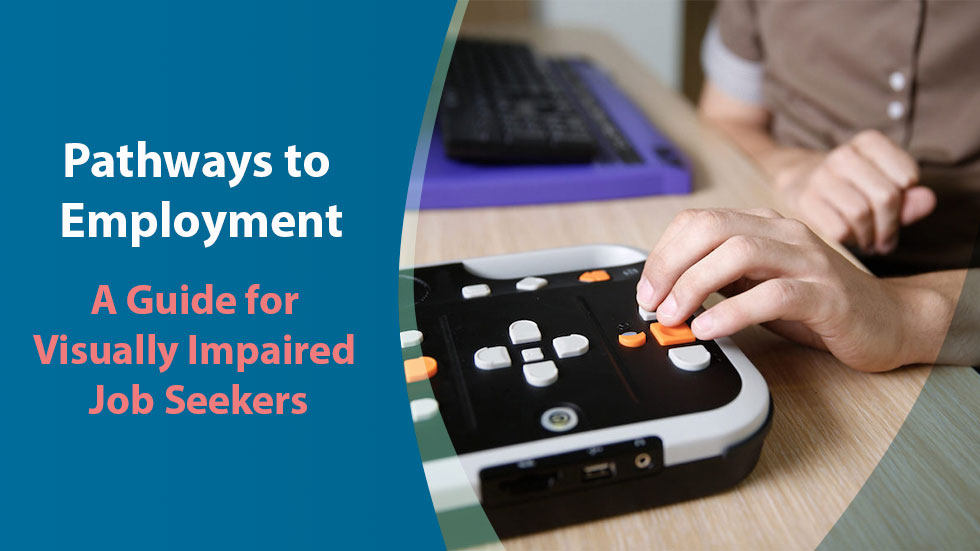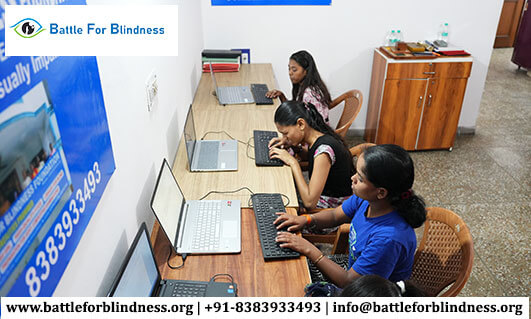
Navigating the job market can be a challenging journey for anyone, but for visually impaired individuals, it often presents unique obstacles. However, with the right resources, tools, and support systems, visually impaired job seekers can successfully unlock meaningful career opportunities. This blog explores essential job market resources, adaptive technology, and strategies that empower visually impaired individuals to build rewarding careers.
1. Career Counseling and Support Services
Visually impaired individuals can benefit significantly from career counseling services that offer tailored advice and support. These services provide guidance on identifying strengths, exploring career paths, and creating job search strategies.
- Disability Employment Services (DES): DES programs help people with disabilities find and keep jobs by offering job search assistance, resume writing, interview preparation, and workplace adjustments.
- Nonprofits and Organizations: Many organizations, such as the National Federation of the Blind (NFB) and American Foundation for the Blind (AFB), offer specialized career programs and resources for visually impaired individuals. These programs often include mentorship opportunities, networking events, and job placement assistance.
2. Accessible Job Boards and Platforms
Several job boards and platforms cater specifically to individuals with disabilities, making it easier for visually impaired job seekers to connect with inclusive employers.
- AbilityJobs: A leading job board for people with disabilities, AbilityJobs features accessible job listings across various industries and connects job seekers with employers who value inclusivity.
- Hire Disability Solutions: This platform focuses on helping individuals with disabilities find job opportunities, offering accessible job search tools, resume resources, and a community network for support.
- Inclusively: This job platform connects people with disabilities, including those who are visually impaired, to employers committed to creating inclusive work environments.
3. Adaptive Technology for Job Search and Workplace Success
Technology plays a crucial role in leveling the playing field for visually impaired job seekers. Adaptive tools and software enable individuals to search for jobs, apply online, and excel in their professional roles.
- Screen Readers and Magnification Tools: Tools like JAWS (Job Access With Speech) and NVDA (Non-Visual Desktop Access) make it easier to navigate job search websites, fill out applications, and work with digital content. Screen magnifiers like ZoomText can assist those with low vision by enlarging text and images on the screen.
- Speech-to-Text Software: Programs like Dragon NaturallySpeaking allow visually impaired individuals to dictate documents and emails, helping streamline job applications, correspondence, and workplace tasks.
- Braille Displays: Refreshable Braille displays connect to computers or smartphones, providing real-time Braille output for reading job postings, emails, or reports.
4. Government Programs and Financial Assistance
Governments often offer programs and incentives to help visually impaired individuals access employment opportunities. These resources provide financial support and job training to ease the transition into the workforce.
- Vocational Rehabilitation (VR): VR programs provide training, education, and job placement services for individuals with disabilities. These programs often offer financial assistance for adaptive technology and workplace accommodations.
- Tax Incentives for Employers: Many countries offer tax credits or incentives to employers who hire individuals with disabilities, encouraging inclusive hiring practices.
5. Networking and Mentorship Programs
Building a professional network and finding mentors can greatly enhance career prospects for visually impaired individuals. Many organizations and online communities offer platforms to connect with industry professionals, peers, and mentors.
- Mentor Programs: Programs such as the Blindness Professional Network (BPN) connect visually impaired individuals with mentors who offer career advice, guidance, and support.
- LinkedIn for Networking: LinkedIn is an accessible platform for professional networking. Use adaptive technologies like screen readers to create a profile, join disability-focused groups, and connect with potential employers and mentors.
6. Interview Preparation and Workplace Accommodations
Interviewing can be stressful, but being well-prepared can help visually impaired job seekers make a strong impression. It’s important to be confident in discussing any accommodations you might need in the workplace.
- Mock Interviews: Many career services and nonprofits offer mock interviews for visually impaired individuals, providing valuable practice in answering questions and discussing how you manage tasks.
- Requesting Accommodations: The Americans with Disabilities Act (ADA) and similar laws in other countries protect your right to request reasonable accommodations in the workplace. Be prepared to discuss what adaptations or technologies help you perform your job effectively, such as screen readers, Braille keyboards, or flexible work schedules.
7. Continuous Learning and Skill Development
Lifelong learning and upskilling are critical in today’s fast-paced job market. Visually impaired individuals can take advantage of accessible learning platforms to continue building their skills and enhancing their employability.
- Online Courses: Platforms like Coursera and Udemy offer a wide range of courses in accessible formats, from coding and digital marketing to soft skills like communication and leadership.
- Job-Specific Training: Many vocational rehabilitation programs and disability organizations offer free or subsidized training in skills like customer service, IT support, or administration, tailored to the needs of visually impaired learners.
Conclusion
While the job market can be challenging, visually impaired individuals have access to a wealth of resources that can help them overcome obstacles and find meaningful employment. From accessible job boards and adaptive technology to mentorship programs and vocational training, the opportunities are out there waiting to be unlocked. By leveraging these tools and strategies, visually impaired job seekers can confidently navigate the job market and achieve professional success.





